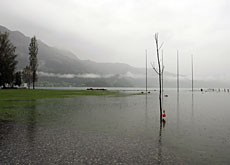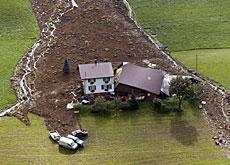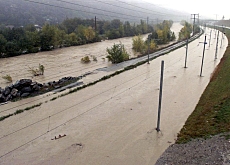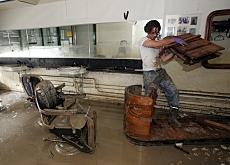Swiss start to count costs of floods

The flooding situation in the worst affected areas of Switzerland eased on Friday, as insurers and farmers began to assess the damage.
Insurers have estimated the costs as reaching up to SFr60 million ($50.11 million) and many crops have been ruined following the worst storms in Switzerland for two years.
Water levels rose and many lakes and rivers burst their banks on Thursday after two days of torrential rain across the country. Particularly hard hit were northwestern Switzerland and the central plateau.
Hundreds of people were evacuated and eight people were injured.
However, the worst appears to be over, according to experts. In the capital, Bern, the water in the River Aare has receded to under the danger level, said the emergency services.
Thun’s lake and Basel’s river levels are also no longer critical, said the local authorities, although both were still very swollen.
Lake Biel, which reached a record high of 430.9 metres on Thursday, has receded by eight centimetres.
The French-speaking part of the country also reported that situation had eased, although the emergency services remain in action.
Counting the costs
Insurers say they have already received lots of insurance claims following the floods. The ten cantonal building insurers said costs could rise to SFr50-60 million. This would mean that in total the year’s damages would amount to an estimated SFr230 million.
In 2005, the year of intense flooding, the costs were SFr870 million for the whole year.
Farmers have also been assessing the effects of the bad weather. The Swiss farmers association says the costs could be as high as SFr5 million. In 2005 the damages were SFr10 million.
The worst affected areas were fields which are underwater. Potatoes, maize and sugar beet could be ruined and other vegetables were also under threat, said the association.
This situation is not covered by insurance, said the association’s president, Hansjörg Walter. “This is a risk that farmers have to run,” he said.
The Swiss vegetable producers’ association also confirmed that salad and vegetable crops had suffered badly and consumer prices could rise “considerably” as a result.
Meanwhile, the transport situation has almost returned to normal, with the Swiss Railways reporting that most of the main lines were running as usual. However, trains on the Bern-Fribourg line were stopped again on Friday.
And Swiss President Micheline Calmy-Rey visited several flood-affected regions, including Delémont in canton Jura.
“Preventive action to avoid the negative impact of climate change was more than ever a priority,” she commented.
swissinfo with agencies
The Swiss Solidarity Foundation, has issued a reminder that it already has a fund-raising campaign after the June floods in Switzerland, which affected the Emmental and Entlebuch regions as well as parts of canton Schwyz.
The foundation led by swissinfo’s parent body, the Swiss Broadcasting Corporation, said the account for donations was Swiss Solidarity 10-15000-6 “Natural Disaster Switzerland”.
Together with partner organisations Caritas (Catholic charity) and the Swiss Red Cross, Swiss Solidarity provides fast and unbureaucratic aid in cases of hardship.
June 8, 2007: Three people died in flooding in Huttwil and Eriswil (canton Bern).
August 21-23, 2005: Eight people died after heavy rainfall and flooding in Bern and east and central Switzerland. Many road and rail connections were cut, with the villages of Engelberg and Lauterbrunnen cut off. The damage came to SFr2.5 billion.
October 14/15, 2000: Persistent rain in canton Valais led to landslides and flooding. Sixteen people died, including 13 in the village of Gondo. The bill came to SFr500 million.
May 15, 1999: Damage estimated at SFr580 million was caused after storms in several regions, including Bern, Thun, Rheinfelden and Lake Constance.
August 15, 1997: Storms with landslides caused damage of SFr120 million in Sachseln, canton Obwalden.
September 24, 1993: After heavy rainfall, the River Saltina burst its banks, causing severe damage in the town of Brig. Two people died, with damage estimated at SFr600 million.
Summer 1987: Eight people died after storms in Poschivao and the Reuss plain in canton Uri. Damage totalled SFr1.3 billion ($1.09 billion).

In compliance with the JTI standards
More: SWI swissinfo.ch certified by the Journalism Trust Initiative



You can find an overview of ongoing debates with our journalists here. Please join us!
If you want to start a conversation about a topic raised in this article or want to report factual errors, email us at english@swissinfo.ch.